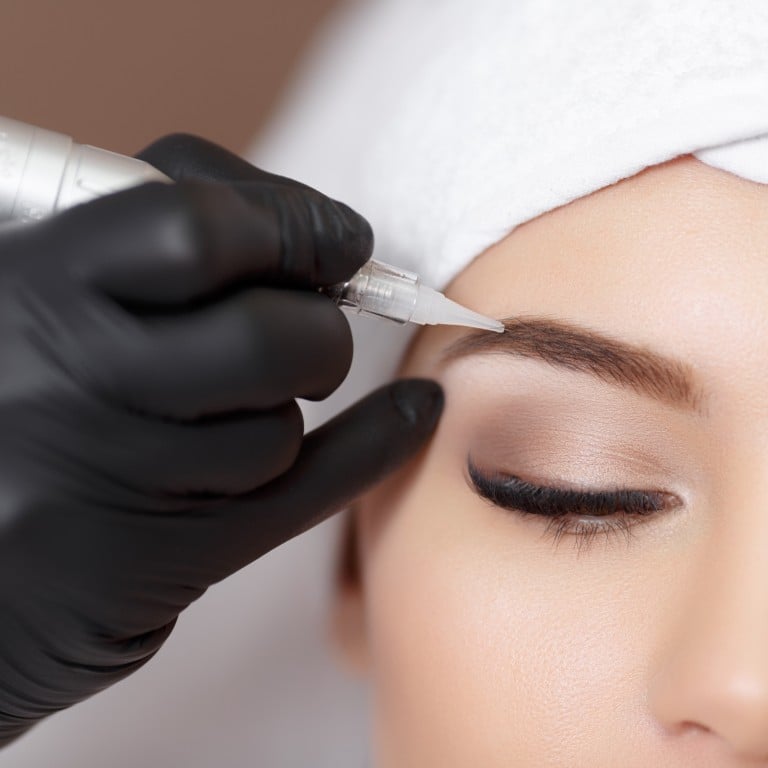
Hong Kong consumer watchdog says complaints over cosmetic tattoos have doubled, warns of injury risk amid growing popularity
- Consumer Council says semi-permanent tattoo procedures, such as eyebrow, eyeliner and lip microblading, pose infection risks and potential loss of vision
- Complaints have increased amid growing popularity of cosmetic tattoos, with some people reporting cases of cut corneas or bleeding scalps, watchdog adds
The number of complaints over botched semi-permanent tattoos has doubled from last year, Hong Kong’s consumer watchdog has said, warning that procedures such as eyebrow and eyeliner microblading had led to cornea injuries and posed a risk of vision loss.
The Consumer Council on Monday said it had received 24 complaints about cosmetic tattoo services in the first nine months of this year, up from the 12 recorded over the same period last year.
“The number of complaints has increased as the popularity of cosmetic tattoos has grown. Since 2020, we have accumulated 80 complaints,” said Gilly Wong Fung-han, the watchdog’s chief executive.
“Among the complaints we received, many involve injuries. Unsatisfactory results are [also] major complaints. We must closely monitor such services.”
Metal in your chocolate? Hong Kong consumer watchdog warns of cadmium traces
The council also warned that cosmetic tattoos, including techniques such as microblading, as well as traditional ones could lead to bacterial and viral infections if the equipment for the procedure was not properly cleaned.
Microblading refers to the technique of injecting coloured pigments into the skin, with the results generally lasting two to six years.
Unclean equipment, such as tattoo needles, could cause blood-borne diseases such as hepatitis B, hepatitis C and HIV, the council said.
Wong also pointed to complaints over cosmetic tattoo services and noted the price tag for the procedure ranged from several thousands Hong Kong dollars to more than HK$10,000 (US$1,277).
Some consumers opting for eyeliner microblading had complained to the watchdog of feeling severe pain and blurred vision after the procedure. Several then visited the hospital or spoke to eye specialists and discovered they had injured corneas.

Wong warned that loss of vision could occur in serious cases and urged consumers not to underestimate the risk of having their eyelines tattooed, just to save themselves the everyday trouble of drawing them on.
She also cited a case where a complainant who underwent lip microblading later suffered severe pain and heavily swollen lips that had prevented them from eating.
Another incident involved a recipient of a hairline tattoo, who reported permanent damage to their hair follicles after they attempted to remove the botched effect and suffered from a bleeding scalp in the process, she added.
“Customers should not take tattooing lightly, especially when lasers and needles are involved in injecting pigment into your skin,” Wong said.
Hong Kong consumer watchdog slams 4 pharmacies over poor sales practices
The council also noted that tattoo inks could contain heavy metals such as mercury, arsenic and lead.
Polycyclic aromatic hydrocarbons, which are potentially carcinogenic, were common in black and dark brown tattoo inks, it added.
The watchdog cited a Council of Europe report that found extensive tattoos could prevent healthcare professionals from using equipment, such as magnetic resonance imaging machines, or identifying melanoma.
While Wong acknowledged that tattoos artists and parlours in Hong Kong were not subject to any qualification or licensing requirements, she said the Department of Health had issued guidelines on infection control, hygiene and equipment safety.
“We will also take reference from jurisdictions overseas depending on the popularity of the service and severity of the cases to see if there is a need to introduce relevant legislation and monitoring systems,” she said.

